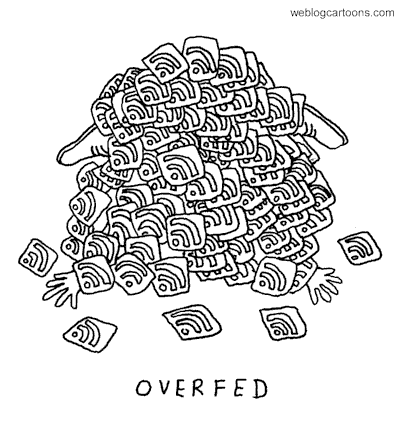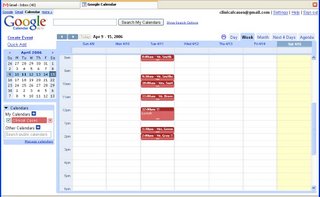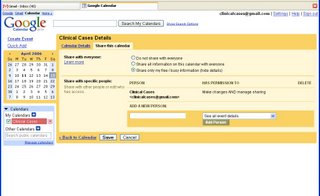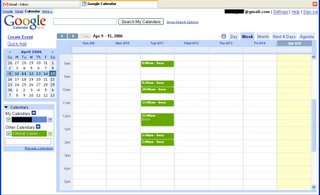reposted from my old blogI have to admit that I've never read Daily Kos. I usually shy away from the A-listers as a habit. It's kinda like shunning the cheerleaders & the real nerds in high school. I went to a weird high school where the A-listers were either cheerleaders or the National Merit folks. I was neither.
Anywho, so I got word that Daily Kos was in town and headed out to check out the new savior of the Progressive movement. You can identify the saviors by the book tours they travel on. I also wanted to ask him "THE QUESTION" in person. Yup, I did. First, Kos started in on why he wrote his book, why he has his blog, why we need a new way of looking at politics, and of course, a new way to organize and elect Democrats to office.
Again, I've never really read his site, but I heard about his
dismissal of
feminists and
abortion rights as a key issue over the summer. As Kos
says, "Why do groups like NARAL and HRC have a hard time grasping the big picture?"
At one point, he mentions something about feminists and about not dismissing them. I jump into his speech and ask, "But on your blog, you have been dismissive of feminists and abortion rights." He retorts, "No, I haven't. I'm as pro-choice as anyone else." I can't recall the exact words, but he essentially says that while he's all pro-choice and knows and sees that abortion rights are under attack ("Look at SD!") the thing is that we need to see the
big picture.
Here's the big picture:
More Democrats = More rights for women
Gawd damn do I wish it were that simple!
Later in another topic, I interjected that Bob Casey was a bad candidate. Kos looked right at me and said, "He's only wrong on one issue." Meaning abortion. OK, so let's look at Bob Casey's stance on the issues. I'll use NOW issues as that's the organization I hang with the most:
Reproductive Justice (aka choice): opposes a woman's right to abortion, supports protecting human life from conception, supports pro-life pharmacists. F
Equal Rights (aka gay marriage): opposes same-sex marriage, supports hate crime leg that addresses crime again GBLT people. C (see, he's not wrong, just not completely right!)
Economic Justice: Won't support a living wage, opposes CAFTA, opposes universal health care. D (again, he gets partial credit!)
Violence Against Women: His issue page is silent.
Ending Racism: His issue page is silent.
OK, I know it's hard to address racism in a campaign, but it's one of our issues. Part of how you address racism is to address the lack of job training, punitive welfare reform, and other issues that overwhelmingly affect people of color.
sources:
Lancaster County Action 2004 Scorecard,
Pennacchio for Senate*,
Bob Casey for U.S. Senate,
In the end, Bob Casey can't earn an A on one issue. Even his environmental page isn't up to snuff with this former Greenpeace canvasser. It seems pretty good, but investing in new technology won't cut it. We have to put the screws to the automakers to force their hand. OK, so I might give him a B.
But for Kos to say that he's only wrong on one issue is so very wrong. I know we can't get a perfect candidate, but come on, why do we need a candidate like Bob Casey? The only reason Kos and other Dems like him are harping on us feministas is that they know the truth:
"Bob Casey can't win a tough campaign against Rick Santorum without a strong turnout from the pro-choice majority in Pennsylvania," Pennacchio said last week. "Democrats should not repeat the mistake we made in 2000" with Ron Klink.
[
link]
But by putting the screws on us now, if Casey loses, the blame put on us will happen so fast, it'll give us all whiplash. "Go ahead ladies, vote thinking only of your wombs! See where that gets you." Or vote for the anti-choice, anti-Roe v. Wade candidate and pray that he won't let yet another anti-abortion USSC Justice on the bench. Oh, wait...he WOULD
support justices that have anti-abortion stances.
Just glancing at his
opponents' issue pages^ makes it glaringly clear that either of these men would be a better and more progressive candidate than Casey.
In the end, I obviously didn't walk away with a signed copy of his book, but I don't hate the man either. We're in a moment where the DNC has to choose which path to take. And there are many paths to take. Kos just thinks that feminists get in the way with all our concern over abortion rights. I say my uterus takes precedent. So I say that we need a new t-shirt. Instead of
this one. We need one that says, "Just say no to sex, with pro-Casey (insert anti-choice Democrat name here) Democrats". See, not just with anti-choice Dems, but with those who support them too.
I'll end quoting one of my
favorite bloggers:
For us, this is the big boys selling out our freedom while we’re instructed to sit back and let those with real “commitment to women’s issues” call the shots. And if that doesn’t bring the funny, I don’t know what does.
*
remind me that if I ever run for office to hire his oppositional researcher.
^ I *love* that Sandals has an issue chart. Great for skimmers like me.
 67 yo CM with a myelodysplastic syndrome has a platelet count of 11/microL.
67 yo CM with a myelodysplastic syndrome has a platelet count of 11/microL.



















